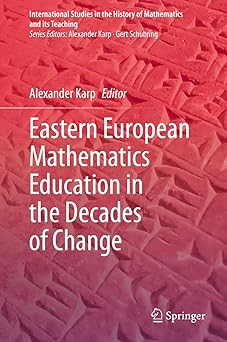
- Author: Alexander Karp, ed.
- Series: International Studies in the History of Mathematics and its Teaching
- Publisher: Springer
- Publication Date: 05/04/2020
- Number of Pages: 563
- Format: Hardcover
- Price: $169.99
- ISBN: 978-3-030-38743-3
- Category: collection
[Reviewed by Andrzej Sokolowski, on 12/26/2021]
The volume Eastern European Mathematics Education in the Decades of Change, edited by Alexander Karp, is contributed work of mathematics professionals from the Czech Republic, Germany, Hungary, Poland, Russia, and Ukraine. The book offers an authentic source of information about the adaptation of educational systems to political and economic changes in these countries after the collapse of the Soviet Union in 1989. It consists of seven chapters; the first six are designated to each of the nations. Chapt. 7 summarizes general trends and layouts a framework for the series continuation.
The velvet revolution marked the transition of the Czech Republic into a democratic and pluralist state. Learner-centered inquiry-based models replaced ideological dependence, dogmatism, and formalism in education. An emphasis was given to new methods in teachers’ preparation programs that focused on pupil-centered learning. A constant evaluation and revision of new policies characterize Czech’s way of finding the best framework for their educational system.
Changes in East Germany (GDR) are viewed through unification and adaptation of West Germany's (FRG) pluralistic system. Rapid changes and a collapse of teacher training in East Germany had adverse effects on the transition process. Yet, a national survey of students’ achievement in STEM undertaken in 2012 showed that East German students did considerably better than their west colleagues. Finding a balance between knowledge acquired through systematically organized learning experiences emerged as a priority of the educational system in unified Germany.
Despite political changes, Hungary preserved many educational policies and math competencies established in 1970 under the Complex Mathematics Education Experiment. While the National Core Curriculum, established in 1989, called for decentralizing mathematics teaching, in late 2000, it returned to being knowledge-centered, preserving teamwork and creativity. Emphases were given on statistics, classical algebra, and geometry content.
Reconstructions of the educational system in Poland were initiated in 1991. While a widely spread training program called New School attracted thousands of teachers, Poland also reached out to Western Europe for best teaching practices. Changes in the Polish educational system were driven by enhancing creative teaching methods and encouraging students to be creative problem solvers. The authors pointed out that more work is to be done in Polish didactics of mathematics to solidify it as an academic research field whose findings would meet the expectations of all math educators and learners.
The Basic School act initiated the reforms in Russia in 1988. While Eastern European countries decentralized their math educations after the collapse of the Soviet Union, integrating what worked the best in the past with the contemporary research findings directed changes in Russia. Realizing differences in students’ learning and creating schools with advanced math courses lead to abandoning the uniformity of mathematics textbooks. Pluralism and humanization were some of the flagships of the changes.
The establishment of the Academy of Pedagogical Sciences of Ukraine in 1992 led the reforms in this country. Differentiated instruction, high diversity of the testing methods, and allowing a textbook selection were some of the changes. In addition, Ukrainian curriculum policymakers also highlighted the development of creative and responsible citizens. Teachers’ positions in the classroom were supposed to change from being authoritarian leaders to facilitators of students’ learning. Reforms in Ukraine continue, and new initiatives under The New Ukrainian School further support this country's transition into a democratic society.
All these authors justified the changes in education by underlying what worked out and pinpointing what needs further research. Such transparency presents the book as a valuable resource for other communities that strive to improve their educational systems. The volume is vibrant with references to official government documents that further support its high validity. While reading the book, some questions arise. For instance, how did teachers who taught under Soviet dictatorship adapt their teaching styles to democratic norms? Another area of research could include the students and their responses to diverse learning methods offered. While the volume is comprehensive within its current criteria, perhaps inviting math professionals from the Baltic states, Bulgaria and Romania could further increase its resourcefulness.
The book editor described a continuation of the book series. Considering the rising economic power and contribution of East European countries to the European society, such endeavor is highly anticipated.
Andrzej Sokolowski, Ph.D., is an author of several books and research papers on developing students’ mathematical reasoning and integrating this reasoning to improve physics understanding. He is also a mathematics and physics professor at Lone Star College, TX, USA.